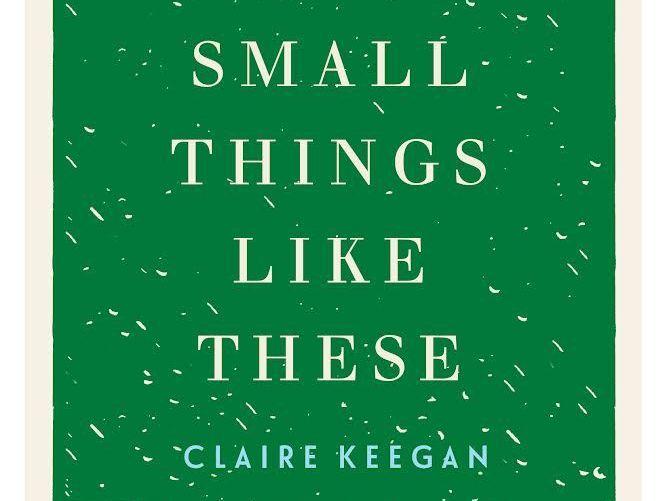Section Branding
Header Content
'Small Things Like These' add up to a seismic change in 1980s Ireland
Primary Content
Bill Furlong, Claire Keegan's unforgettable protagonist in Small Things Like These, makes his giant leap from a series of measured steps. The idea of seemingly insignificant gestures, which — "when added up, amount to a life" — aligns beautifully with the meaning of his last name. Furlong means "furrow length" — the distance of one-eighth of a mile that a team of oxen could plough without resting.
While Keegan dedicates Small Things Like These to "the women and children who suffered time in Ireland's Magdalen laundries" — horrific asylums run by Roman Catholic institutions for most of the 20th century, ostensibly to reform "fallen young women" — her compact, crystallized narrative does not train its gaze on these victims or the nuns who imprisoned them within high walls "topped with broken glass," but instead on Bill Furlong and his harrowing quest for meaning.
Like the Catholic parish that presides as a monolith over the town of New Ross in 1985 Ireland, Bill's social background reflects both salvation and oppression.
Born to an unwed teen employed as a live-in maid by Mrs. Wilson — a kindly Protestant widow — Bill grew up in the elderly woman's large, comfortable home, nurtured by his mentor's generosity and her progressive ideas but clear-eyed about his illegitimate status as perceived by the town's inhabitants.
Over time, like a Dickensian hero, Bill gains social acceptance as a hardworking coal merchant, marries Eileen — a woman from a middle class family — and becomes doting father to five smart, lovely daughters.
But the respectability that Bill has worked so hard to maintain, namely "to keep his head down and stay on the right side of people," and to ensure his daughters' success at St. Margaret's — the only good Catholic school for girls in New Ross — often puts him in an existential funk.
As a perpetual outsider, Bill senses danger in rituals that others take for granted, and aches for his youngest daughter when she becomes frightened by a "big, fat Santa," like the Pied Piper luring a horde of children toward a cave of shiny presents during the town's holiday parade. The heartwarming tableau of his wife and daughters making mince pies for Christmas nevertheless makes Bill wonder if the daily grind of providing for his family is all there is to life.
While the vise-like rhythm of daily life threatens to suffocate his spirit, it also hints at the deep loss he would suffer if stability is renounced.
Small Things Like These can be read as a feminist revision of Charles Dickens' A Christmas Carol — to which the novel explicitly alludes. While Dickens uses his story to challenge the unequal distribution of wealth in Victorian society, his message nevertheless reinforces patriarchal values by celebrating the male-centric and materialist aspects of Christmas, rather than its spiritual elements.
Scrooge decides to change his miserly ways only when faced with visions of being rejected by the world — his desire for redemption motivated by vanity and fear of loneliness. Bill, on the other hand, seeks meaningful transformation while knowing full well that his action could ostracize not just himself but his entire family.
His antagonist — the Good Shepherd Convent —represents not the spiritual realm but the world. While this institution claims to uphold love, faith, and charity, its capitalist operation of the town's laundry business, in collusion with the Irish government to exploit and abuse downtrodden women, shows a ghastly betrayal of Christian ideals.
Time and timelessness are the novel's DNA strands. Bill's struggle is timeless in evoking the fragility of civil society before an oppressive system. Ominous signs, such as a December murder of crows "scavenging for what was dead, or diving in mischief for anything that looked edible," ripening fruits from a secluded garden, as well as the Cinderella trope of orphaned girls deprived of walking shoes and mistreated by their "ugly sisters" (the nuns), give the novel a fairytale quality. At the same time, the culturally-specific milieu of 1980s Ireland heightens the potentially tragic consequences of Bill's action.
Overall, Keegan's exquisitely ambiguous finale shows that narratives about at-risk young women are not confined by fiction or time.
It's uncertain how Bill's act of courage will impact his daughters — whose well-being has inspired his wish for radical change in the first place — over time. The gaps between Bill's fictional 1985 act of resistance, the closing of the Magdalen laundries in 1996, and the Irish government's belated apology to the victims in 2013, show that justice, sadly, takes decades to arrive.
Thúy Đinh is a freelance critic and literary translator. Her work can be found at thuydinhwriter.com. She tweets @ThuyTBDinh.
Copyright 2021 NPR. To see more, visit https://www.npr.org.

